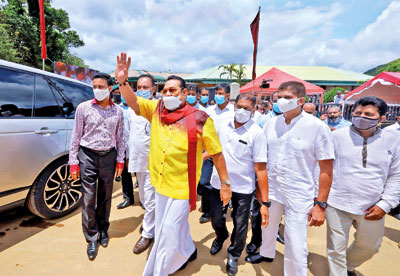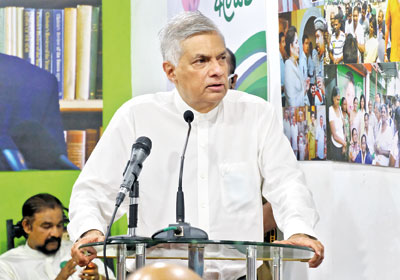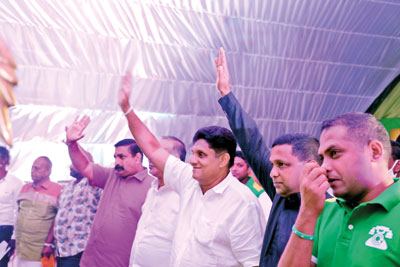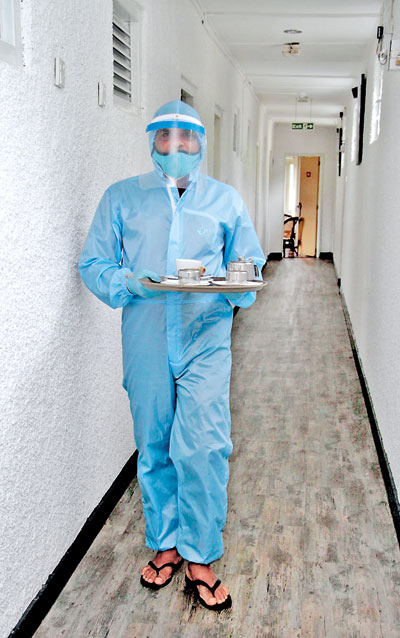Columns
- Varying predictions and expectations, but voter turnout likely to be low mainly due to COVID-19 pandemic
- SLPP leaders confident but two-thirds majority impossible due to the PR system
- Navin drops political bombshell by seeking UNP leadership, Ranil brushes it aside saying ‘anything can be said in politics’
- SJB issues much-awaited manifesto in Sinhala but main pledges are vague and have little clarity
NUWARA ELIYA: There are more roadside stalls selling Durian and Rambuttan fruits all along a cross-country run on the main road from Colombo through four districts — Ratnapura, Badulla, Nuwara Eliya and Kandy — due to a glut from a rich yield.
The only exception is in Nuwara Eliya where there is more. They are stalls with fresh vegetables. Strange but true, the prices, if not more, are as steep as those in Colombo and suburbs. ‘Little England’ as this picturesque holiday city is still known, has its British colonial trappings. Plantations that boast of renowned high grown varieties of tea are shrinking extraordinarily little by little. Though not to alarming levels, like little drops forming an ocean, it could someday turn out to be a sea of vegetables. The reasons appear to be many.

Prime Minister Mahinda Rajapaksa arriving for the SLPP's Teldeniya meeting. Pix by Indika Handuwala
The origins of this transition at a tortoise’s pace are political. Plantation workers have been demanding a higher wage. Management companies who run the estates that now belong to the state say it would be uneconomical for them. Thus, the debate over a wage of one thousand rupees a working day continues. “There are other serious aspects confronting the tea industry today,” says veteran planter Herman Gunaratne. He said that in the Nuwara Eliya and Badulla districts, a number of tea factories had shut down due to a steady drop in crop caused by an acute shortage of fertilizer. “Alarm bells are already ringing,” he warned. Plantation workers are clearing uncultivated areas to grow vegetables that bring them more money for their sustenance.
Retired after a successful career as a planter, Gunaratne, no longer passes by the luscious tea bushes every morning giving orders to young planters and Kankanis (supervisors). He is campaigning for his son, former Governor of the Central and later Uva provinces, Maithri Gunaratne, for the Badulla district at the August 5, parliamentary elections.
In the Ratnapura district, where there are sizeable extents of mid-grown tea and thriving pepper plantations, it appears no different from the central highlands. There is shortage of fertilizer in this area too, planters, and small holders, complain. The gem trade in the Ratnapura town has resumed after the lockdown and there is hectic activity by dealers wearing facemasks. Most of them come from Colombo and Beruwala. The town is a little mecca for dealers who bargain for uncut gems from those digging in surrounding areas. They are later sold, after a cut and polish, for higher prices. This is how instant millionaires are made though a few end up as paupers after dealing with dud stones. Not so long ago, Thai buyers thronged this town that goes under water after a heavy rainfall, looking for Geuda . They were subjecting this variety of gems to heat treatment and converting them to sapphires. They occupied many houses and shops bringing rents to a premium. The flow dried up later.
Like the world over, the coronavirus has quickly and radically changed things in Sri Lanka. A 450-kilometre journey through the four districts displays the usual sights and sounds. Significant enough, one that every Sri Lankan expects most importantly, is absent. There is hardly any sign of the impending polls activity. There are no posters. Crowds wearing shirts of their party colours are not there. Nor are the loud hailers mounted on vehicles including three-wheeler scooters contributing in no small measure to sound pollution.

UNP leader Ranil Wickremesinghe addressing a political meeting. Pic by Sameera Weerasekara
The only reminder, along the road from Ratnapura to Haputale, was a large bill- board adjoining an office of the Samagi Jana Balavegaya (SJB). The face of party leader Sajith Premadasa was covered with a large piece of black polythene. So was the name, preference number of the candidate for the district and the telephone, the SJB symbol. Election laws prohibit their public exposure. Another was an office of the Janatha Viumukthi Peramuna (JVP) which is contesting under the grouping National People’s Power. Red flags flew but there were a handful present. Two houses had green flags and name boards which said United National Party. Other than that, life went on with hardly any sign of political activity. People moved around as if there were no parliamentary elections. To say that campaigning is lacklustre is to make a total overstatement.
The face of election campaigns has changed though it may not be forever. The good side is that on an average, campaign costs have come down. Figures vary from electorate to electorate. Most said it was by some 30 to 40%. There are no expenses for major rallies and the resultant advertising costs. Costs to feed supporters and cheer squads are also less. Adding to that were transport costs to muster crowds. This has led to an increase in house-to-house campaigns. Of course, there are exceptions.

SJB leader Sajith Premadasa and party stalwarts taking part in a Badulla campaign rally.
In the Colombo district, candidates have been spending lavishly even making “gifts” to some with Rs 10,000 or more. Smart phones have now become the political platform with SMS and WhatsApp messages delivering polls propaganda. There was a group of more than 13 persons, some without facemasks, going from house to house in the Pelmadulla area. At least two of them ran to a vehicle parked a little distance away and returned wearing face masks. That, no doubt, broke health guidelines but there was little that either the Police or health officials could do. The Public Health Inspectors (PHIs) are on strike. Not even when such guidelines have been made law through a Gazette notification. There are many examples.
Health guidelines ignored
Last Sunday, President Gotabaya Rajapaksa, who was on the campaign trail stopped over for lunch at Silver Ray Restaurant, just a few kilometres before the Pelmadulla town. His convoy of vehicles escorted President Rajapaksa to the car park at the rear of the building. The presence of armed Special Task Force (STF) personnel and Police in front of the hotel from morning had alerted the public. Many lined up the spacious car park area, some even without facemasks, to watch the President arrive. He was taken to a secure ground floor area while some 60 or more security personnel queued up on the upper level where buffet lunch is served. The restaurant went short of food and it took time to replenish forcing some of the regular motorists to skip a stopover of their favourite eatery.
Last Monday, Prime Minister Mahinda Rajapaksa turned up at the Teldeniya town for a meeting at the bus stand. The health regulations stipulate a maximum presence of 500 persons. “He is a magnet to pull crowds. Another 500 persons or more turned up. We could not turn them away. They were checked and allowed to the bus stand area where the meeting was held,” said Gamini Rajapaksa, a former United National Party (UNP) parliamentarian. He was a member from 1977 to 1989 and thereafter from 1994 to 2000. He is now a staunch backer of the Sri Lanka Podujana Peramuna (SLPP) and ally of Premier Rajapaksa. “There was no way for those concerned to turn away the crowds,” he said. “The people demanded that they be let in to hear Premier Rajapaksa,” the former MP said. Even during opposition meetings, the crowd turnout has exceeded the 500-limit placed by the recently Gazetted health guidelines. There were many with no face masks.
Sri Lanka Muslim Congress (SLMC) leader Rauff Hakeem, who is contesting on the SJB ticket from the Kandy district, charged that there was disenchantment among the minority communities. “The government is doing all it can to split Muslim community votes and punish their leaders under different pretexts,” he complained. “It will not succeed. Muslims know the humiliating hardships they have faced at the hands of the government,” he added. SJB leader Sajith Premadasa joined his party’s campaign in the Kandy district on Friday. Like all other candidates, he has also been busy conducting small meetings and door-to-door campaigns.

At the Bandarawela Orient Hotel, a hotel employee wore PPE to ensure they adhere to health guidelines
Former Minister and Leader of the House in Parliament, Lakshman Kiriella, is confident of victory. The SJB’s Kandy district candidate said he was proud to give leadership for the construction of the central expressway where a journey from Colombo to Kandy would take just two hours. He said only three more kilometres needed to be completed.
The house-to-house campaigns are also laying bare some interesting, if not disturbing, social aspects. The lockdown has led to youth who held lower category jobs in restaurants, hotels, supermarkets, and some companies to return to their homes. They are now unemployed adding to the burdens on the chief householder. It has also enhanced the numbers unemployed together with those who have returned mostly from West Asian countries and others. In the Badulla district, a senior Police official, who did not wish to be named, said that developments after the post-lockdown period in their area of responsibility have spawned newer security threats. Thefts were rising and, in some households, there was only one main meal, a lunch or a dinner. “If there is no remedial action, things could get worse,” he warned.
Hotels catering to foreign tourists including budget travellers have opened but visitors are yet to come. Here again, the change due to Covid-19 is showing. At the front entrance to the Orient Hotel in Bandarawela, men standing outside, at first glance, resembled those wearing space suits. (see picture on this page.) They were covered from head to toe in protective gear with face shields and masks. Wiping one’s feet on a wet rug, washing hands with disinfectant and then rubbing alcohol-based hand wipe are compulsory. The hotel was clearly trying to show it was taking health guidelines seriously for the welfare of its guests.
Navin’s claim for leadership
In Nuwara Eliya, once the stately residence of the fifth Governor of British held Ceylon (then called Barnes Hall), the Grand Hotel has become alive again. Edward Barnes was a British Army Officer, acting Governor of Ceylon from 1820 to 1821 and thereafter appointed Governor from 1824 to 1831. He is widely credited with the success of Sri Lanka’s planting enterprise. He constructed the network of roads linking the hill country to the coast. A billiards player, some of the cues he used are still at the Grand Hotel. The hotel is a reminder of the lifestyles enjoyed by those in the British raj. President Gotabaya Rajapaksa, again on the election trail, arrived there for lunch this week. Ahead of the visit, guests came in the form of advance security personnel.
The Presidential Suite was being dusted and cleaned for an overnight visit by UNP leader and former Prime Minister Ranil Wickremesinghe. Cricketer Mutthiah Muralitharan, renowned spinner in the cricket world, has taken up virtual residence. He is campaigning for his brother Muttiah Prabagaran, who is contesting on the SLPP ticket. The candidature was offered to Muralitharan earlier, but he does not want to enter politics. There is activity at the Golf Club though visitors, some on overnight stays from Colombo, are still a trickle. Former Speaker Karu Jayasuriya was at the Hill Club taking a break from campaigning for his son-in-law, Navin Dissanayake, who is contesting on the UNP ticket from the Nuwara Eliya district.
Dissanayake, former Minister and now UNP National Organiser, created quite a sensation with some controversial remarks at an election meeting in Hatton. He declared that there was a need for change in the UNP leader and declared he would take that post. “The same person (Ranil Wickremesinghe) who has been leader for 26 years cannot continue,” he said, pointing out that the party should also change. Addressing another meeting later at Ginigathhena, he called for the introduction of a secret ballot to pick future UNP leaders. Many UNPers left the party giving the same reasons but why did Dissanayake choose to make those remarks on the eve of an election? Until now, he has strongly defended Wickremesinghe including his leadership of the UNP. The two of them shared the same platform yesterday (Saturday) in Nuwara Eliya.
At the rally Dissanayake stated that he had been hoping to take over the party after Pramadasa but he had become impatient and broke away.
He added that previous party leaders had been elected via a secret ballot and that he was hopeful that Wickremesinghe would remain neutral when the time comes to pick a new party leader.
Wickremesinghe did not refer to the party leadership issue when he had spoken after Dissanayake.
During the November presidential election, he backed now SJB leader, Sajith Premadasa. He even ensured that a truck was converted as a mobile political platform and gave it to Premadasa for his use. He then extolled the virtues of Premadasa at public meetings. Thereafter, he switched to become a vociferous critic of Premadasa and stout defender of Wickremesinghe. The fact that the UNP is split in this hill country town, in as much as other areas, is all too well known.
Dissanayake feels he would not receive a segment of the votes from the UNP and fears that it may go to the SJB. One political wag quipped that Dissanayake, now the National Organiser of the UNP under Wickremesinghe’s leadership, was “shifting positions like changing clothes.”
Asked about this during a television talk show, Wickremesinghe deftly dodged Dissanayake’s remarks by saying “anyone can say anything.” UNP and SJB frontliners are baffled by Dissanayake’s remarks. If he wins, can he still remain in the UNP and become its leader is one question. It is on the basis that those who took up cudgels with the UNP leader had to leave. Another is what happens if he loses? Will both the UNP and the SJB choose to ignore him? He has already created an environment for the forfeiture of his post as UNP National Organiser. Unlike his late father, Gamini Dissanayake, who was a close confidante of President J.R. Jayewardene, son Navin has remained controversial for the positions he has taken from time to time. From the UNP, he crossed over to the SLFP and was in the last Cabinet of President Mahinda Rajapaksa. During the August 2015 parliamentary elections, he crossed over again and contested on the UNP ticket.
Promises in SJB election manifesto
The Sajith Premadasa led SJB, after a protracted delay, released the Sinhala text of its manifesto. Copies are being widely circulated in these four districts like in others. However, with just nine days to go for the parliamentary elections, the English text is still not available. According to one of party front-liners now, Shiral Lakthilake, who was earlier Senior Advisor to former President Maithripala Sirisena, among the highlights will be:
n Virtuous Nationalism that enshrines fraternity and solidarity in a strong Sri Lankan society ensuring racial and religious harmony.
n Meritocracy-based upward social mobility through multiple equal opportunities for all to achieve their life goals.
n Restoration of Rule of Law by regaining its dignity by eradication of corruption, malpractices, and misuse of resources, starting from the top.
n Establish democratic decision making at all level of (politics/governance/government) by defeating all kinds of authoritarian tendencies.
n Socially responsible and globally relevant education system entrenched in humanistic and entrepreneurial values.
n Sustainable agricultural model that ensures food safety and security while increasing farmer incomes through productivity and entrepreneurship.
n Defeat poverty through innovation, collective and productive initiatives.
n A sustainable and smart economic model based on balanced, inclusive green growth, that reduces national debt, increases foreign earnings.
n Fool-proof human resource and infrastructure development to enable a sustainable and smart economy.
n Establish an unconquerable, strong, and stable nation state within the unitary framework with efficient and inclusive decentralisation.
The ongoing muted election campaign has been a sounding board for President Gotabaya Rajapaksa. He told the weekly ministerial meeting at the Presidential Secretariat on Friday that during visits to different electorates, he had been able to learn of the major difficulties faced by the people. He identified that the absence of road networks in some areas was a key issue. Hence it warranted priority consideration. Two of the other issues were the absence of equipped hospitals and more schools. Besides them, he pointed out that there were also the non-availability of water resources and the mounting incursion of wild elephants into human habitat. As he referred to the elephants, one Minister interrupted the President and asked, “Can’t we export them to another country?” Minissu deng ali elawanawa” or people are now chasing elephants, said another in a double-edged remark. The second was the UNP’s symbol, the elephant. There was a round of hearty laughter.
Govt.’s new road development plans
There are more elaborate plans before the government for road development. The China Harbour Engineering Company has put forward a proposal for the “Colombo Port City Road Network Extension towards South and East of Sri Lanka. The CHEC, a Chinese company, has noted that the “Colombo Port City,” next to the Central Business District, is the largest green field investment project in Sri Lanka.” It has said that US dollars 1.4 billion will be invested towards this project, and US dollars 13 billion of secondary development is expected to be invested. An area of 269 hectares is already reclaimed with tradeable area of 165 hectares.
The CHEC, coming as a private investor, has placed three different options for the government to decide on before a feasibility study is carried out. That includes one in which it has proposed an Elevated Highway Project (as a Special Purpose Vehicle – SPV) costing around US$ 155 million to operate and transfer the project. Until transfer, the CHEC is seeking entitlement to toll revenue.
“The proposed projects,” the CHEC has said “are international-standard highway developments, and will serve as platforms to achieve the following objectives and benefits:
a. As the necessary utilities to meet the travel demands generated by the increasingly transportation tools and give an easy access to expressway network from/to Colombo Central Business District area and the Port City.
b. Provide a boost to economic development in the surrounding areas through the provision of linkage of road system.
c. Provide a boost to employment for the region in
Sri Lanka and bring positive impacts to society.
d. Generate additional passengers and cargo for the highway network resulting in reciprocal benefits.
In his observations on the proposals, Prime Minister Mahinda Rajapaksa, who is also the Minister of Finance, has noted that priority will be given to projects which are commercially viable and have no direct burden on the national budget. He has noted that this is in view of the prevailing economic situation and increase in foreign and local debt in the fields of roads and highways which have already acquired a significant portion of the national budget.
He has also noted that both the Road Development Authority (RDA) and the Board of Investment (BoI) should take necessary measures to lower the project cost on the total investment value with the investor in view of the geological, geographical, geotechnical and environmental concerns etc. in order to minimise design and cost variations during the construction period. He has said no changes will be entertained to the total investment price during the construction period. Among other matters, Premier Rajapaksa has said that the project should be under the guidance/approval of the National Planning Department in terms of directions given by the Presidential Secretariat.
Compared to the majority of districts, there is a relatively visible political activity both in the Colombo and Jaffna districts. In the former, most of the campaigning is being carried out in the social media. The footprints of Ravi Karunanayake (UNP) and Champika Ranawaka (SJB), both former ministers in the Yahapalana government, are prominent. Karunanayake’s slogan is “leading with humanity.” A former minister who held the portfolios of finance and later foreign affairs, Karunanayake has made this one-liner the thrust of his media campaign. In small group meetings he addressed, Ranawaka, on the other hand, complained of what he calls victimisation and harassment against him by government leaders.
In Jaffna, election meetings are being held mostly in covered areas, with the Tamil media there providing extensive coverage. With internal conflicts within the Tamil National Alliance (TNA), the main contender, the outcome of the poll in the peninsula is keenly watched. There have been claims of foreign funding to a TNA stalwart in the Tamil media, but he has strongly denied them. Abraham Sumanthiran, former MP is the most protected candidate in the peninsula. A Sub Inspector and 15 commandos from the Special Task Force (STF) have been assigned to provide personal protection.
The cross-country shuttle laid bare one especially important reality — that there is no widespread enthusiasm over the impending elections. The coronavirus is the main reason. The result — a low turnout at the polls is becoming an increasing certainty. Strong indications of this came when it transpired that only 40 percent of those eligible have cast their postal votes prompting the Election Commission to extend voting by two more days. Its Chairman Mahinda Deshapriya told the Sunday Times (Political Commentary – July 12) “…Usually we have a turnout of over 80%. If we are below 75% this time, it will be a failure for us…” Premier Rajapaksa told an election meeting this week that he expected the voter turnout to be 70%, far below Deshapriya’s expectations. The question that arises from this — for whom is it advantageous, to the SLPP-led alliance or the opposition parties? Most believe it is for the former.
In the United States, at the 2016 presidential election, the voter turnout was 55.7%. At Britain’s parliamentary elections in 2019, it was 67.3% India, the world’s largest democracy, registered a voter turnout of 67.4% during its parliamentary elections last year.
Yet, there are those who argue that there will be a greater interest from voters as the poll day nears. A prominent UNP member said their supporters will go and vote to prevent the SLPP “winning a two-thirds majority,” which is next to impossible under the proportional representation system. Another UNPer, however, acknowledged that there were UNPers who did not want to cast their votes as a mark of protest against the division of the party. Be that as it may, one fact that is clear in the August 5 elections is that the voters are more concerned about their stomachs than marking crosses on the ballot paper.


August 5 polls: The stomach is more sensitive than the brain